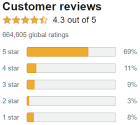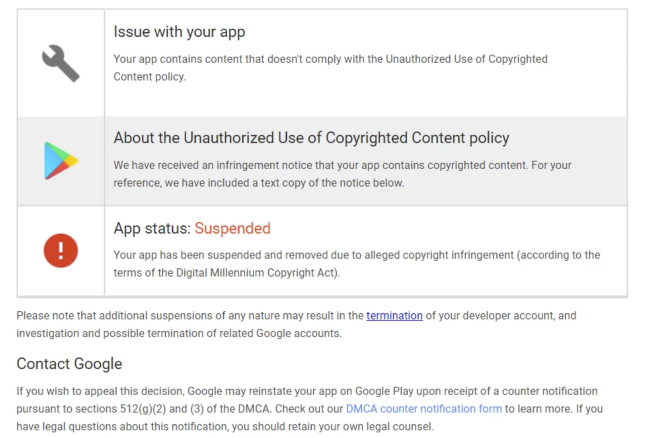-
chevron_right
Google Bans ‘Downloader’ App: TV Outfits Claim Browser Violates Injunction
news.movim.eu / TorrentFreak · Tuesday, 23 May, 2023 - 11:34 · 7 minutes
 If the best ideas are always the simplest, in 2016 software developer Elias Saba hit the jackpot.
If the best ideas are always the simplest, in 2016 software developer Elias Saba hit the jackpot.
Two years after Amazon launched its first generation Fire TV, there was still no easy way to transfer files to the device. Released on the Amazon Appstore in November 2016, Saba’s ‘Downloader’ app offered users just two things; an empty URL field and a download button. It was basic yet functional, and in time, extraordinarily successful.
The Amazon Appstore and Google Play currently account for more than 50 million installs of Downloader, underpinned by Saba’s decision not to charge a single penny for the software.
 At the time of writing, Downloader has 664,605 customer ratings on Amazon, averaging 4.3 stars out of a possible five. For several TV companies from Israel, Saba’s work, success and generosity are of no consequence; Downloader is in their way and has to go.
At the time of writing, Downloader has 664,605 customer ratings on Amazon, averaging 4.3 stars out of a possible five. For several TV companies from Israel, Saba’s work, success and generosity are of no consequence; Downloader is in their way and has to go.
Google Kicks Downloader Out of the Play Store
In a notification sent to Sabas yesterday, Google informs the developer that “after a recent review,” Downloader was found to contain content that “doesn’t comply with the Unauthorized Use of Copyrighted Content policy” operated on the Play Store.
The review was prompted by a copyright complaint from Israel-based TV companies HOT Communications Systems Ltd, DBS Satellite Services (1998) Ltd, United King Distribution Videos (1990) Ltd, and Charlton Ltd.
“We have received an infringement notice that your app contains copyrighted content,” Google’s notice explains. “Your app has been suspended and removed due to alleged copyright infringement (according to the terms of the Digital Millennium Copyright Act).”
Google’s notification reveals that the TV companies supplied no details of specific original content or details of content allegedly infringed. As a DMCA takedown notice, it arguably fails at the very first hurdle. Instead, the notice draws Google’s attention to a feature added to Downloader more than six years ago.
The companies claim that this feature violates an injunction the TV companies obtained from a New York court in 2022. Neither the injunction, nor the process that led to its issuance, have anything to do with Saba or his software.
Since the TV companies claim otherwise, a little background may help.
Users Demand More, Get More
Within weeks of its launch, Downloader’s users were already requesting new features. For Saba, a former Fire TV Product Manager at Amazon, that didn’t come as a surprise. As a developer, it wasn’t a problem either.
“I added basic file management and a web browser to Downloader in February 2017 because users complained that it was too tedious to enter long URLs using a remote control and the on-screen keyboard,” Saba informs TorrentFreak.
The addition of a web browser didn’t just consign long URLs to history; for Downloader and its users, a little history was being made. While Downloader users happily searched Google and navigated to files displayed on a TV , bigger players in the software market were still playing catch up.
TV Surfing Pioneer Taken Offline on a Whim
When Downloader fueled free, accessible web browsing via TV sets, Saba says that filling another gap in the market was an accident, an “unintended side-effect” of the new feature.
“My app predated nearly all stand-alone web browsers on streaming devices, including Amazon’s own Silk browser and Firefox, which arrived on TV streaming devices six months after my app gained a web browser,” Saba recalls.
While popular in its own right, Downloader was about to get a huge boost. Popular open source media player Kodi was previously available from Amazon’s Appstore but after the company removed it , only unofficial installation methods remained.
In an April 2017 tweet , the people behind Kodi described Downloader as ‘The only correct way of installing Kodi on Amazon devices.” Over the years, millions of people followed that advice.
Saba estimates that over 45 million Fire TV users installed Downloader at some point. At the time of writing, Downloader has at least five million active installs on Android TV devices through Google Play. Downloader is free and the nearest thing it has to an advert is Saba’s blog, AFTVNews.com , loading as the browser’s default homepage.
Downloader’s browser feature is the start, middle and end of the TV companies’ complaint to Google.
Browser Can Access a Pirate Streaming Site
The bones of the complaint fit neatly into a single paragraph. Sent to Google by Eran Presenti, a partner at M. Firon & Co., one of Israel’s largest law firms, it reads as follows:
“[T]his app which can be downloaded to any Android based device including smart TV – allows users to view the infamous copyright infringing website known as SDAROT (www.sdarot.tw) against which the are 2 Isareli court and a NY Federal court judgments issuing permanent injunction against the saus website [sic].”
Google Chrome, an app that arrives pre-installed on millions of Android devices, also allows users to view the infamous Sdarot. The same is true for Safari, Edge and Firefox. All of them show an image similar to the one below in response to input featuring Sdarot’s URL.
Evidence that Downloader’s browser displays websites in response to user input is reportedly contained in eight screenshots listed by Google. Saba actually received eight filenames ending in .jpg, but no actual images.
A link to a website in the notice claims to provide a copy of an ‘Amended Default Judgment & Injunction’ dated July 6, 2022. The link was supposed to lead to sdarot.tv, a domain previously owned by Sdarot but later seized by the TV companies. A copy of the injunction isn’t available because the domain itself is completely broken.
Despite acting as the evidence behind Downloader’s removal from Google Play, Saba informs us that the screenshots and injunction remain a mystery to him. Fortunately, we know all about the underlying case and injunction; more interestingly, Google knows all about it too.
TV Companies Fight a War They Can’t Win
HOT Communications, DBS Satellite, United King and Charlton Ltd are on a mission to destroy Sdarot, Israel’s largest pirate site. The subscription streaming platform has been targeted in at least three lawsuits, all of them decided in favor of the plaintiffs, yet still refuses to die.
In May 2022, we broke the news that the companies had obtained an injunction from a New York court that required every ISP in the United States to block Sdarot and two other pirate sites.
What happened next remains shrouded in mystery but the record shows that after winning the injunction, the TV companies decided they didn’t want U.S. ISPs to block the sites after all.
The scope of the injunction remained a concern. It began with consumer ISPs but also prohibited any webhost, CDN provider, DNS provider, domain company, advertising service, financial institution, or payment processor from doing business with the sites’ operators moving forward. Cloudflare, Google, EFF, and industry group CCIA felt strongly enough to intervene in the lawsuit.
With no means to protect itself from an injunction that failed to narrowly target specific, identified defendants and their agents, and/or third parties in active concert or participation with them, Cloudflare refused to comply with its terms and the TV companies’ “blatant attempt at a power grab.”
The TV companies unwisely moved to hold Cloudflare in contempt but in the weeks that followed, the injunction was amended and the TV companies went after Sdarot instead.
Sdarot Remains Online, Downloader Targeted
For reasons that currently make little sense, the TV companies seem to have cited an injunction that appears to have nothing to do with Saba or Downloader, to convince Google that displaying the Sdarot website, after someone keys Sdarot.tw into Downloader’s browser, is a breach of its terms.
Since Saba’s initial appeal to Google was rejected, he’s since filed a DMCA counternotice to have Downloader reinstated. That’s currently listed as pending but at least in theory, Google should reinstate the software unless the TV companies file a lawsuit against Saba.
Thus far, however, legal action against intermediaries has failed to achieve its primary goal. A review of the position on the ground today suggests a situation that’s arguably worse than before.
Sdarot now operates from a Taiwan .tw domain which present its own legal challenges. As for the site’s hosting, Sdarot now spreads its infrastructure across several countries including Moldova and Russia, utilizing a number of hosts that are well-known for filing DMCA complaints in the cabinet marked ‘TRASH’.
From: TF , for the latest news on copyright battles, piracy and more.














